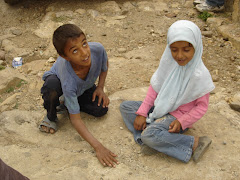Another sign that the vacuum created by the contraction of US legitimacy in the Middle East is being replaced by those Arab states NOT allied with the US. The Gaza offensive has done more to legitimize the Syrian regime than decades of "land and sovereignty" speeches. This may be the best time for the US to approach the Syrian regime, when the latter no longer feels isolated and reactionary. Although the US is unlikely to get everything it asks for in a negotiation, the Syrian regime has been relatively cooperative even without carrots (taking in Iraqi refugees, cooperation in the aftermath of 9-11, reacting peacefully to the Israeli strike last September and the more recent US attack near the Iraqi border with Syria). Damascus is again becoming a center for Pan-Arab sentiment, weakening the 'moderate' Arab states allied with the US. But this isn't necessarily bad news for the US, which might benefit from a more domestically legitimate partner in the Middle East peace process.
Syria and the new Arab 'cold war'
By Catherine Miller
BBC News, Damascus
It was standing room only at Damascus Opera House this week. Middle class Syrians packed the hall for a concert called We Shall Endure - a message from Damascus to Palestine.
Many had come for the star attraction, Marcel Khalife, one of the most famous musicians in the Arab world.
But they were also there to express their grief and anger about the war in Gaza.
"We have the same blood as the Palestinians," said one young woman. "Any drop of blood they shed, we feel it too."
That sentiment has prompted an overwhelming response from Syrians.
The opera house audience paid five times the normal price for a ticket with all proceeds going to Gaza.
And the Syrian Red Crescent has gathered more donations than any other Arab country.
Regimes out-of-step
The Syrian Government is authoritarian, and critics say it has little regard for the opinions of its citizens.
But during the war in Gaza it spoke for people here and many across the Arab world when it threw its weight behind the militant group Hamas and denounced Israel as a terrorist state.
That put it at odds with so-called moderate Arab countries, such as Egypt and Saudi Arabia.
Some say the bitter dispute between Arab governments made it easier for Israel to pursue its own agenda.
"The Arab people are more developed than the Arab governments and regimes," said Khalife after the performance.
"There is no problem with any Arab from the Gulf to Morocco. The problem is with the regimes not with the people."
On their knees
Syria is home to about 500,000 Palestinian refugees, who were displaced in the Arab-Israeli wars of 1948 and 1967.
In Palestine Camp, the neighbourhood where the majority live, the green banners of Hamas flutter over the market place and the walls are plastered with posters of Palestinian gunmen brandishing their weapons.
"The Europeans and the other Arab states hate Syria because it stands with the resistance," said one man, seething with anger.
"They want Syria to be on its knees like those other Arab countries who eat and drink with the money of the West."
A crowd gathers and everyone agrees.
"If the rest of the Arab world was like President Assad," said another, "the Palestinians would have won long ago."
Proven wrong
Egypt is seen as the villain here. It is condemned for failing to open its border to Gaza and relieve the besieged people there.
"They cannot understand why Egypt has no leadership in the region and is choosing to go against the wave," says Tarek, an Egyptian working in Damascus.
He says he tries not to give away his accent to avoid discussions about Egypt's perceived betrayal.
The political elite is in tune with the street.
Samir al-Taqi, director of Orient Centre for International Studies, a think tank close to the Syrian government, says Egypt, Saudi Arabia and other countries who put their faith in the good intentions of Israel and the US have been proven wrong.
He believes Syria's role in the region has been strengthened.
"The Israelis and the Americans have weakened the arguments of their allies and empowered those of their enemies.
"There is disappointment from those regimes who had followed them and there's a certain hope about the resistance."
Whipped up
But others say it is too early to say who has won what has been described as an Arab Cold War.
"This struggle is far from over. It's a vicious and bitter struggle being played out," says Peter Harling, an analyst in Damascus for the International Crisis Group.
In recent months, Syria has been working hard to come in from the diplomatic cold and had opened indirect negotiations with Israel. After the war in Gaza, it suspended those talks.
"It's very difficult having whipped up the Arab street and Syria's population in particular to move back towards any kind of dialogue with Israel."
Arab governments have now made some attempts to patch up their relationships. But the mood in Damascus is uncompromising.
For people here, the ruins of Gaza are proof that the Syrians and their militant allies who kept their weapons and their distrust of Israel were right.
Sooner or later, they feel, the rest of the Arab world will have have to join them.
Tuesday, January 27, 2009
Subscribe to:
Post Comments (Atom)

No comments:
Post a Comment